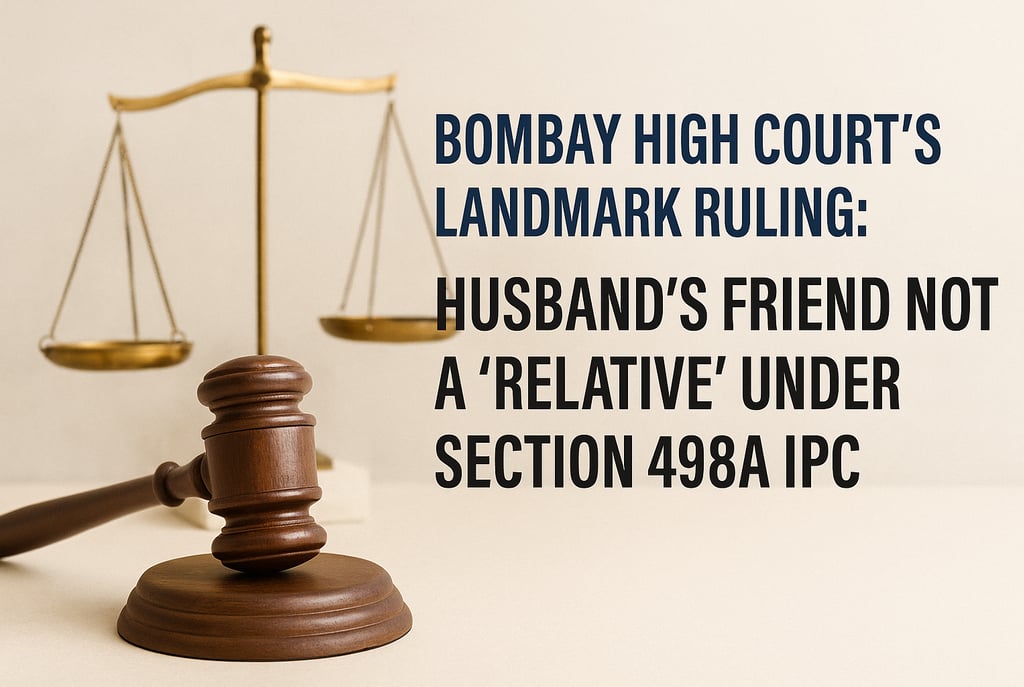Bombay High Court’s Landmark Ruling: Husband’s Friend Not a ‘Relative’ Under Section 498A IPC
Bombay High Court rules that a husband’s friend is not a ‘relative’ under Section 498A IPC. Learn how this landmark judgment impacts 498A misuse cases and FIR quashing in India.
Adv Nadeem Saifi | Partner | Altius Astra Attorneys
8/1/20253 min read


Nagpur, July 29 – In a significant judgment that could reshape how Section 498A of the Indian Penal Code is applied, the Nagpur Bench of the Bombay High Court has ruled that a husband’s friend cannot be treated as a “relative” and therefore cannot be prosecuted for cruelty under this provision.
This decision, delivered by Justices Anil Pansare and Mahendra Nerlikar in NMM v. State of Maharashtra (Criminal Application 1619 of 2023), not only quashes the FIR filed against the accused but also sets a strong precedent clarifying who can be brought under the ambit of Section 498A.
But why does this ruling matter? And what does it mean for ongoing and future 498A cases? Let’s break it down.
What the Case Was About
The complainant-wife had filed an FIR on June 13, 2022, alleging that her husband’s friend frequently visited their matrimonial home, encouraged her husband to demand a car and a plot from her parents, and even insisted that her husband refuse to cohabit with her until those demands were met.
Based on her complaint, Chandrapur Police not only filed an FIR but also submitted a chargesheet against the husband’s friend under Section 498A IPC, a section primarily intended to penalize cruelty by a husband or his “relatives.”
However, the accused approached the Bombay High Court, contending that he was merely a friend and did not fall under the definition of a “relative.”
The Court’s Reasoning: Who is a “Relative”?
The court relied heavily on previous Supreme Court precedents. The apex court had earlier clarified that even a girlfriend or a woman with whom a man has an extramarital affair cannot be called a "relative" under Section 498A.
Justice Pansare, writing for the bench, observed:
“The term ‘relative’ under Section 498A contemplates a status conferred either by blood, marriage, or adoption. A friend of the husband does not meet any of these criteria. Therefore, he cannot be prosecuted under this section.”
This interpretation aligns with the legislative intent behind Section 498A—to prevent cruelty by those who have a recognized familial relationship with the woman. The court unequivocally held that stretching this definition to include friends would be legally untenable.
Why This Judgment is a Game-Changer
Over the years, Section 498A has been criticized for its alleged misuse, with courts repeatedly cautioning against implicating distant relatives or unrelated individuals without proper evidence. This ruling adds judicial clarity, ensuring that only those with a legally recognized relationship can be prosecuted under this provision.
Friends, colleagues, and other unrelated acquaintances who are often dragged into domestic disputes now have a stronger legal shield. The judgment can serve as a powerful precedent for quashing similar FIRs.
The decision also indirectly protects the integrity of genuine cases by preventing unnecessary prosecution of unrelated third parties, thus allowing courts to focus on actual instances of cruelty.
What Lawyers Are Saying
Speaking to Altius Astra Attorneys, legal experts noted:
“This judgment underscores the importance of not overextending criminal liability. Section 498A was never intended to be a tool for settling personal scores against unrelated third parties. This ruling reaffirms that principle.”
Senior advocates believe this judgment could also be cited in future cases involving false implication of friends, neighbors, or co-workers, thereby helping courts streamline 498A litigation.
What This Means for You
If you are facing a 498A FIR where unrelated persons, like a friend or distant acquaintance, are implicated, this ruling could be a decisive factor in seeking relief from the High Court.
However, it’s crucial to remember that this does not dilute the section against genuine offenders, husbands and their immediate family members can and will still be prosecuted if found guilty of cruelty.
Key Takeaway
The Bombay High Court’s ruling is a watershed moment for Indian criminal law. By quashing the FIR against the husband’s friend, the court has drawn a clear boundary: only those with a legally recognized relationship can face trial under Section 498A IPC.
Will this judgment pave the way for stricter scrutiny of 498A complaints? Possibly. And for those wrongfully implicated, it might just be the legal lifeline they were waiting for.
Altius Astra Attorneys
A premier law firm based in Delhi, India, offering legal representation across various practice areas for citizens rights and interests.
© 2025. Altius Astra Attorneys. All rights reserved.
Contact Us
📞 9899290789, 9818786756
📧 contact@altiusastra.com
3C-ED Block, Madhuban Chowk, Pitampura, Delhi-110034
DISCLAIMER
